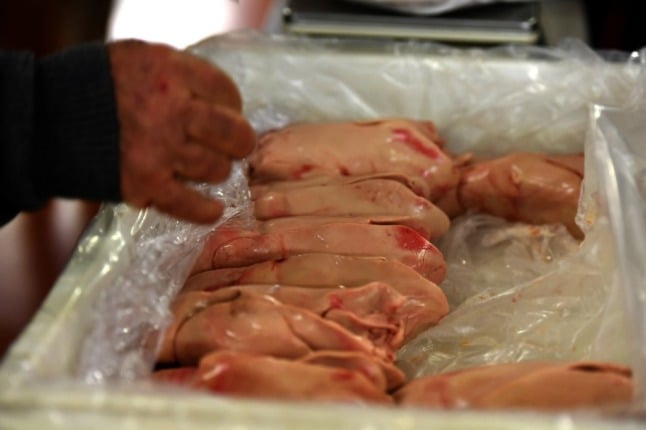Many French schools have foie gras on the Christmas lunch menu. It is dished up in a variety of ways – either as a stuffing or as a spread.
But three towns (Grenoble, Strasbourg and Villeurbanne) governed by the Green party have banned the product in school canteens and for official town-hall functions. The move comes after years of pressure from the animal rights group, PETA.
READ ALSO Do French kids get the best school lunches in the world?
Sandra Krief, a city councillor in Grenoble for the Parti Animaliste who also campaigned for the ban, tweeted that the production of foie gras was “one of the worst practices or ‘traditions’ as far as animal cruelty is concerned.”
“Foie gras is a shameful French tradition that should be abolished like bullfighting,” she continued.
READ ALSO Meet the French Animal Party candidate running for president
France makes about two thirds of the world’s foie gras, produced by force-feeding ducks or geese until the develop the distinct ‘fatty liver’.
In an interview on Sud Radio, Marie-Pierre Pé, director of France’s Inter-professional Committee of Foie Gras makers hit back, saying the ban was “scandalous”.
“Anyone who goes to meet producers understands that the fattening comes towards the end of the animal’s life. It totally respects the life of birds, which are there to produce this famous foie gras that the whole world is jealous of,” she said.
“There is more and more attention being paid towards the wellbeing of the animals.”
READ MORE French mayor’s foie gras ban prompts fury from farmers
PETA is now campaigning to have foie gras scrapped from menu at official town hall functions in other cities, including Bordeaux, Lyon, Marseille and Montpellier.
The French delicacy has been under attack around the world for years. The EU parliament called on member states to ban the practice of force feeding this summer – and has banned the product from official events in the Strasbourg parliament building. In the United States, California has banned the sale of foie gras produced with force feeding. The British government plans to do the same.
Michelin-starred chef, Alexis Gauthier, has a potential solution that could reconcile animal rights activists and foie gras lovers: Faux gras – a plant based alternative. You can read the recipe HERE or watch the tutorial.
READ MORE Lab-grown ‘foie gras’ cannot use product name, says French food producers group



 Please whitelist us to continue reading.
Please whitelist us to continue reading.
Ms Pe says ‘the whole world is jealous of foie gras’. Not quite true since India, Australia, Israel, UK , Argentina, and Brazil have all banned its importation and many others its production. Animal cruelty is nothing to shout about.
Another British tourist sticking his nose into our way of life. If you don’t want to eat it, that’s your choice but don’t tell other people, that enjoy eating it, not to.👿
Some people need telling. There’s nothing libertarian about torturing animals.
Who is talking about being libertarian. I’m saying keep your nose out of my countries affairs. My friends and I will keep eating foie gras for as long as we want. It’s a great shame your little island banned hunting with dogs. What’s it going for next. fly-fishing.😮
Actually, you’ll only keep eating it until the EU inevitably bans it
Considering the best is produced on small farms, I very much doubt a blanket EU ban is going to have much of an effect.
Boggy, stop taking CAP subsidies and you can have all the free choice you want. But as long as I am paying taxes to keep this ugly practice going then I get a say. In any case, if you read the article you’d know it is other French who are opposing this and other French who are saying that these (French people) have no right to do so. Marie-Pierre Pé said it clearly: she thinks it is scandalous that others get to have a choice in any decision to buy damaged duck liver. In essence she wants to force feed it down students throats. The irony of that no doubt escapes her.